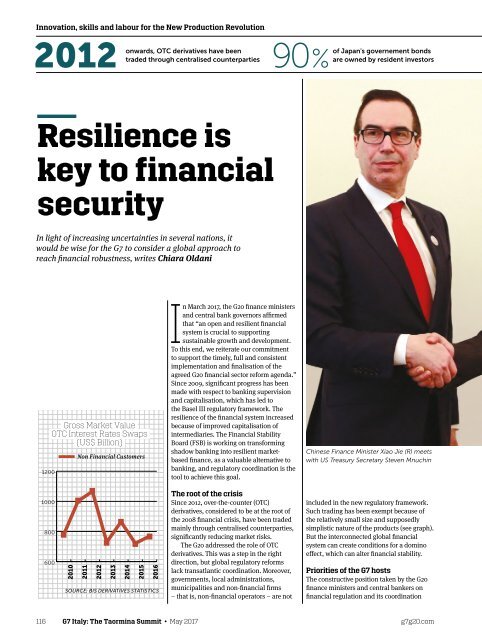G7 Italy-digi
G7 Taormina The 43rd annual Group of Seven (G7) summit, taking place in Taormina in Sicily, Italy, on May 26-27, 2017, will be an unusually important event. Its central participants, time, place, purpose and priorities will inspire it to act on the key issues that cannot be left alone for others later on.
G7 Taormina
The 43rd annual Group of Seven (G7) summit, taking place in Taormina in Sicily, Italy, on May 26-27, 2017, will be an unusually important event. Its central participants, time, place, purpose and priorities will inspire it to act on the key issues that cannot be left alone for others later on.
You also want an ePaper? Increase the reach of your titles
YUMPU automatically turns print PDFs into web optimized ePapers that Google loves.
Innovation, skills and labour for the New Production Revolution<br />
2012 90%<br />
onwards, OTC derivatives have been<br />
traded through centralised counterparties<br />
of Japan's governement bonds<br />
are owned by resident investors<br />
Resilience is<br />
key to financial<br />
security<br />
In light of increasing uncertainties in several nations, it<br />
would be wise for the <strong>G7</strong> to consider a global approach to<br />
reach financial robustness, writes Chiara Oldani<br />
1200<br />
Gross Market Value<br />
OTC Interest Rates Swaps<br />
(US$ Billion)<br />
Non Financial Customers<br />
---<br />
In March 2017, the G20 finance ministers<br />
and central bank governors affirmed<br />
that “an open and resilient financial<br />
system is crucial to supporting<br />
sustainable growth and development.<br />
To this end, we reiterate our commitment<br />
to support the timely, full and consistent<br />
implementation and finalisation of the<br />
agreed G20 financial sector reform agenda.”<br />
Since 2009, significant progress has been<br />
made with respect to banking supervision<br />
and capitalisation, which has led to<br />
the Basel III regulatory framework. The<br />
resilience of the financial system increased<br />
because of improved capitalisation of<br />
intermediaries. The Financial Stability<br />
Board (FSB) is working on transforming<br />
shadow banking into resilient marketbased<br />
finance, as a valuable alternative to<br />
banking, and regulatory coordination is the<br />
tool to achieve this goal.<br />
Chinese Finance Minister Xiao Jie (R) meets<br />
with US Treasury Secretary Steven Mnuchin<br />
1000<br />
800<br />
600<br />
2010<br />
2011<br />
2012<br />
2013<br />
2014<br />
2015<br />
2016<br />
SOURCE: BIS DERIVATIVES STATISTICS<br />
The root of the crisis<br />
Since 2012, over-the-counter (OTC)<br />
derivatives, considered to be at the root of<br />
the 2008 financial crisis, have been traded<br />
mainly through centralised counterparties,<br />
significantly reducing market risks.<br />
The G20 addressed the role of OTC<br />
derivatives. This was a step in the right<br />
direction, but global regulatory reforms<br />
lack transatlantic coordination. Moreover,<br />
governments, local administrations,<br />
municipalities and non-financial firms<br />
– that is, non-financial operators – are not<br />
included in the new regulatory framework.<br />
Such trading has been exempt because of<br />
the relatively small size and supposedly<br />
simplistic nature of the products (see graph).<br />
But the interconnected global financial<br />
system can create conditions for a domino<br />
effect, which can alter financial stability.<br />
Priorities of the <strong>G7</strong> hosts<br />
The constructive position taken by the G20<br />
finance ministers and central bankers on<br />
financial regulation and its coordination<br />
116 <strong>G7</strong> <strong>Italy</strong>: The Taormina Summit • May 2017 g7g20.com
















